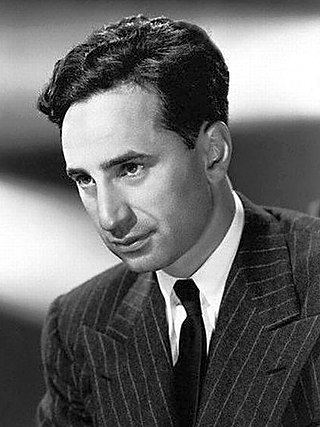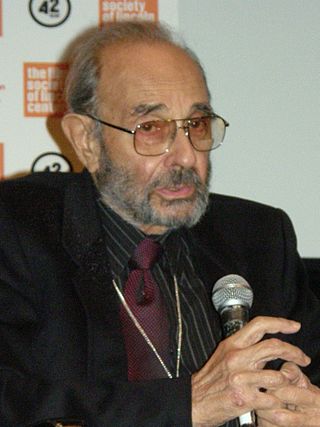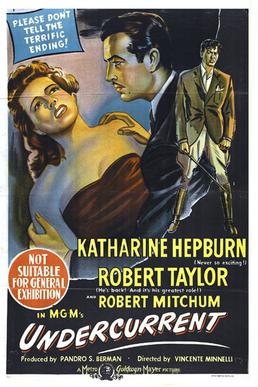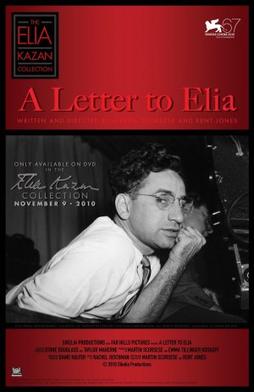
Martin Charles Scorsese is an American film director, producer, screenwriter and actor. Scorsese emerged as one of the major figures of the New Hollywood era. He is the recipient of many major accolades, including an Academy Award, four BAFTA Awards, three Emmy Awards, a Grammy Award, three Golden Globe Awards, and two Directors Guild of America Awards. He has been honored with the AFI Life Achievement Award in 1997, the Film Society of Lincoln Center tribute in 1998, the Kennedy Center Honor in 2007, the Cecil B. DeMille Award in 2010, and the BAFTA Fellowship in 2012. Five of his films have been inducted into the National Film Registry by the Library of Congress as "culturally, historically or aesthetically significant".

Elia Kazan was an American film and theatre director, producer, screenwriter and actor, described by The New York Times as "one of the most honored and influential directors in Broadway and Hollywood history".

The Golden Globe Award for Best Director – Motion Picture is a Golden Globe Award that has been presented annually by the Hollywood Foreign Press Association, an organization composed of journalists who cover the United States film industry for publications based outside North America, since 1943.

Vincente Minnelli was an American stage director and film director. He directed the classic movie musicals Meet Me in St. Louis (1944), An American in Paris (1951), The Band Wagon (1953), and Gigi (1958). An American in Paris and Gigi both won the Academy Award for Best Picture, with Minnelli winning Best Director for Gigi. In addition to having directed some of the best known musicals of his day, Minnelli made many comedies and melodramas. He was married to Judy Garland from 1945 until 1951; the couple were the parents of Liza Minnelli.

Stanley Donen was an American film director and choreographer. Donen directed some of the most iconic films of the Golden Age of Cinema. He received the Honorary Academy Award in 1998, and the Career Golden Lion at the Venice Film Festival in 2004. Four of his films have been inducted into the National Film Registry at the Library of Congress.

The Directors Guild of America Awards are issued annually by the Directors Guild of America. The first DGA Award was an "Honorary Life Member" award issued in 1938 to D. W. Griffith. The statues are made by New York firm, Society Awards.

Raoul Walsh was an American film director, actor, founding member of the Academy of Motion Picture Arts and Sciences (AMPAS), and the brother of silent screen actor George Walsh. He was known for portraying John Wilkes Booth in the silent film The Birth of a Nation (1915) and for directing such films as the widescreen epic The Big Trail (1930) starring John Wayne in his first leading role, The Roaring Twenties starring James Cagney and Humphrey Bogart, High Sierra (1941) starring Ida Lupino and Humphrey Bogart, and White Heat (1949) starring James Cagney and Edmond O'Brien. He directed his last film in 1964. His work has been noted as influences on directors such as Rainer Werner Fassbinder, Jack Hill, and Martin Scorsese.

Samuel Michael Fuller was an American film director, screenwriter, novelist, journalist, actor, and World War II veteran known for directing low-budget genre movies with controversial themes, often made outside the conventional studio system. Fuller wrote his first screenplay for Hats Off in 1936, and made his directorial debut with the Western I Shot Jesse James (1949). He would continue to direct several other Westerns and war thrillers throughout the 1950s.

Ralph Meeker was an American film, stage, and television actor. He first rose to prominence for his roles in the Broadway productions of Mister Roberts (1948–1951) and Picnic (1953), the former of which earned him a Theatre World Award for his performance. In film, Meeker is perhaps best known for his portrayal of Mike Hammer in Robert Aldrich's 1955 Kiss Me Deadly.

Undercurrent is a 1946 American film noir drama directed by Vincente Minnelli and starring Katharine Hepburn, Robert Taylor, and Robert Mitchum. The screenplay was written by Edward Chodorov, based on the story "You Were There'" by Thelma Strabel, and allegedly contained uncredited contributions from Marguerite Roberts.

Richard Warren Schickel was an American film historian, journalist, author, documentarian, and film and literary critic. He was a film critic for Time magazine from 1965–2010, and also wrote for Life magazine and the Los Angeles Times Book Review. His last writings about film were for Truthdig.
Jeanine Basinger is an American film historian who retired in 2020 as the Corwin-Fuller Professor of Film Studies and Founder and Curator of The Cinema Archives at Wesleyan University, Middletown, Connecticut.
The 14th Golden Globe Awards, honoring the best in film for 1956 films, were held on February 28, 1957, at the Cocoanut Grove, Ambassador Hotel.

Dorothy Spencer, known as Dot Spencer, was an American film editor with 75 feature film credits from a career that spanned more than 50 years. Nominated for the Academy Award for Best Film Editing on four occasions, she is remembered for editing three of director John Ford's best known movies, including Stagecoach (1939) and My Darling Clementine (1946), which film critic Roger Ebert called "Ford's greatest Western".
AFI's 100 Years...100 Movies – 10th Anniversary Edition was the 2007 updated version of AFI's 100 Years...100 Movies. The original list was unveiled in 1998.
The World Cinema Project (WCP), formerly World Cinema Foundation, is a non-profit organization devoted to the preservation and restoration of neglected world cinema, founded by Martin Scorsese.
All-TIME 100 Movies is a list compiled by TIME magazine of the 100 "greatest" films that were released between March 3, 1923—when the first issue of TIME was published—and early 2005, when the list was compiled. Compiled by critics Richard Schickel and Richard Corliss, the list generated significant attention, receiving 7.8 million hits in its first week alone.

A Letter to Elia is a 2010 documentary film directed by Kent Jones and Martin Scorsese that follows the life and career of film director Elia Kazan and how he influenced Scorsese. Made from clips from films, stills, readings from Kazan's autobiography, a speech he wrote on directing read by Elias Koteas, a videotaped interview done late in Kazan's life, and Scorsese's commentary on and off screen.

The Story of Film: An Odyssey is a 2011 British documentary film about the history of film, presented on television in 15 one-hour chapters with a total length of over 900 minutes. It was directed and narrated by Mark Cousins, a film critic from Northern Ireland, based on his 2004 book The Story of Film.
Modernist film is related to the art and philosophy of modernism.














